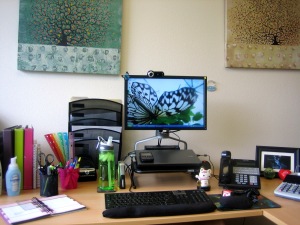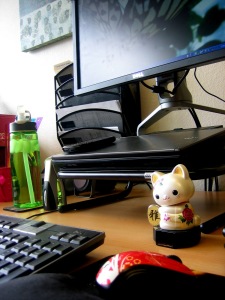Live Love Work: Love your work-life!
Namaste!
It’s a beautiful day in Colorado, as many days are breathing in fresh Rocky Mountain air and looking out at clear blue skies.
This gorgeous morning I am thrilled to share with you my newly re-designed website for Live Love Work! Live Love Work can now be found at www.liveandlovework.com. Please stop by and take a look! Your comments and feedback are appreciated.
If you are a current subscriber to Live Love Work, please take the opportunity to renew your subscription to keep new articles coming to your mailbox.
I am deeply grateful for your interest in Live Love Work, and I hope you find inspiration here. I look forward to sharing my experience, strength and hope with you, as you practice loving your work-life!
Connect with me:
Subscribe via email
Follow me on Twitter
Like Live Love Work on Facebook
Discover your choices and own your success!
You have choices. Too often we react to life and blame people, places and things for getting in the way of our happiness and success. The truth is the only thing in the way of your happiness and success is you. Your attitude, behavior and belief system has a greater impact on your life than anything or anyone else.
The good news about accepting responsibility for your success is you begin to influence your life and career positively. You’re no longer at the mercy of your boss, your co-workers or customers- you’re directing your life.
Recognizing your choices helps you make smart decisions, and follow a new course of action when a choice you made is no longer working for you.
The idea of taking ownership of your happiness and success is easier said than done. Your behavior and belief system has been shaped over the years by internal and external stress and pressure, and it takes months or years of practicing positive behaviors to create change.
Maybe you are lucky enough to have experienced positive internal and external influences and attitudes and you are already living a life taking ownership of your choices. That’s great- keep it up!
Whether or not you are already aware of your choices and responsible to yourself, you have to keep practicing these principles to live the life of your dreams and enjoy an accomplished, fun and rewarding work-life.
Taking ownership of your work and your life can come in many forms. If you stop and reflect on your attitudes, you can re-adjust your perspective and begin to take responsibility of your experience.
Start taking responsibility for yourself using “I” statements.
Using “I” statements is a tried and true method of conflict resolution and it also applies to all your thoughts and conversations about your life.
Listen to yourself talk about your career to co-workers, family and friends. Do you say “I feel”, “I want”, and “I am”? Use “I” statements to own your thoughts, feelings and emotions.
“I” statements give you power over your own experience so you can do something about it.
Take responsibility for your life.
You can’t be all things for all people. You probably can’t even be most things for some people. If a situation is not your responsibility, don’t assume responsibility for it.
You are only responsible for yourself in the workplace. From manager to assistant, your job is to do your own work first and foremost. If someone else isn’t doing their part, it’s not your job to pick up the slack. Nor is it your responsibility to police anyone else at work.
You will find greater satisfaction and success at work if you stay out of other people’s work and mind your own.
Tell your story.
When you tell someone about your day, do you find yourself going into great detail about the actions of others? Avoid telling stories about other people’s behavior. You can’t control what anyone else does or says and focusing on someone else’s influence over your day gives your time and energy to someone else.
Starting today, when you talk about your day focus on you. What did you do? How did you contribute? What are your ideas?
Focus on solutions.
Career success is built on solutions. Identify a problem or need in your business and find a solution. Don’t complain about the problem, be the one to step up and solve a problem.
Doing your assigned work is not enough to achieve your goals and dreams. Tackle a tricky problem and you’ll build confidence, gain experience, show initiative and you might even create a new process or product that saves your company time or generates profit.
Discover your choices.
Ask yourself if what you’re doing is working out for you. If something in your life isn’t working, you have a choice. You have a choice about your attitude, perceptions and your action and reactions.
If you’re stuck, make a list of every possible choice you can make from the unlikely to the productive. If you are unemployed, your list might include everything from “become a hobo” or “become a street performer” to “get a part time job” or “join a networking group”.
Making a list of your choices will help you recognize that you have choices. You aren’t stuck. You may not have the choice you want, but you do have choices.
Taking ownership of your success and embracing your choices will improve the quality of your work-life and create opportunities in your career.
I’d love to hear from you! Please share a choice you’ve made today. Use an “I” statement to tell me about your day. What is your story?
Image by Flominator
Creating an organized workspace is about more than just organization- you can create a space that inspires, engages and energizes you in the work you do every day.
Do you want a workspace that boosts your mood, productivity and creativity? Organizing your workspace can improve the quality of your work-life and add a little fun to your work day. Here are 8 tips for organization and inspiration!
1. Get rid of anything that doesn’t work for you.
If an item in your workspace isn’t working for you, get rid of it.
Do you have pens that don’t work and pencils that are unsharpened? Do you like the feel, color and point of your pens? Is your pen cup big enough for your favorite writing utencils? Does your stapler function smoothly and is the fit comfortable in your hand?
Trying to work with an item that isn’t working for you is draining your energy and minimizing your efficiency. Ask yourself if the items on and around your desk are working for you. Give away, recycle or trash unwanted items that are adding clutter and fuss to your workday.
2. Invest in the right tools.
Shop around for desk organizers, file organizers and other items that will suit your individual needs.
If you don’t have desk drawers, you may need a desktop organizer with drawers or divided cups to separate the supplies you use regularly. Make it easy to reach for and find the things you need without rooting around or sorting through miscellaneous supplies thrown together in a drawer or box.
Consider wall files and incline desktop sorters that store files and papers vertically instead of desk trays which stack papers on top of each other. Use printable file folder labels and stagger the tabs so you can quickly and easily find the file you’re looking for.
Don’t underestimate the value of adjustable monitor stands that not only raise your monitor to eye level, but can also free up desk space for supply storage.
Invest in the tools you need; it’s worth spending a little extra to get something that is going to make your work-life easier every day.
3. Keep what you need close at hand.
Keep files and supplies you use daily within easy reach. Remove any items from your immediate reach that you don’t use regularly to declutter and clear your space for productive work.
Keeping the items you use often in reach may require investing in the right organizational tools so you can have paperclips, tape, or whatever supplies you use regularly at your fingertips. Don’t put something in a drawer that you have to use over and over each day- keep it on your desk where you can grab it without changing your position.
4. Create a reference binder.
Use a 3-ring binder to keep reference materials organized and easily accessed.
My reference binder has a one-page-per year calendar with holidays and closures circled in red, a phone list, an account list, key policies and procedures, a list of desk stretches, tips for minimizing stress, and a whole lot more!
Think about the information you need to reference often and information that is important to easily access when you’re under a deadline, on the phone, or under stress and include it in your reference binder.
Consider slipping your reference papers into plastic page covers so you can put view them back-to-back and handle them frequently without tearing or soiling the pages.
5. Make it ergonomic!
Raise your monitor to eye level. Use wrist rests for your keyboard and mouse. Adjust your chair height or invest in a footrest. Take care of your body and it will take care of you! You’ll feel better and experience less mental stress if your body isn’t stressed all day long.
6. Use color!
Color-coding your files can help you quickly and easily find the documents you’re looking for and help you return items to the appropriate file so you always know where to find it next time.
In addition to color-coding, using color in your organization and decoration can boost your mood. Choose colors that calm and soothe you, like blues and greens, or choose colors that excite and energize you, like reds and pinks.
Color can add style and personality to your workspace in addition to organization and help you create a space you love.
7. Show your style.
In addition to color, use textures, artwork and designs that inspire and engage you.
Make your workspace personalized not only with personal photos, consider adding personality with your office decoration. Display art on your walls, and use artistic office supplies that come in a variety of colors, styles and designs. You can find a designer mouse, notebooks, file folders and so much more!
8. Have fun with a digital photo frame.
Use a digital photo frame to display photos, quotes and images that make you laugh, make you smile and fill you with happiness. A digital photo frame allows you to easily add or change the images and doesn’t clutter your desk or wall with multiple photos, frames and notes.
My digital photo frame has pictures of family and friends, vacation photos, and LOLcats!
Creating a workspace you love will encourage productivity, focus and increase happiness in the workplace. Don’t just organize your workspace- let it inspire you! Think of ways your workspace can engage you and help you do your best work every day.
What do you love about your workspace? What organizational tips work for you?
I learned everything I needed to know about life in kindergarten, and I learned (almost) everything I need to know about my career riding a motorcycle.
Actually, I ride a scooter. My scooter, a light blue 2009 Genuine Buddy 125, with an impressive 125cc engine, is registered as a motorcycle. (Think scooters can’t go very fast? My Buddy 125 can get up to speeds of 70 miles per hour and get 85 miles per gallon! )
I’m an avid scooterist, riding year-round in Colorado, and riding my scooter is a lot like successfully navigating my career. Riding safely while sharing the road with other vehicles is a lot like working in a corporate environment.
Here’s what I’ve learned about riding and my career success:
Take the road less traveled.
Riding on roads with less traffic allows me to relax and enjoy the ride. I don’t have to fight for my space on the road and there’s often fewer traffic stops, though the actual riding distance may be longer.
In your career there is more than one path to success. Not only do career goals vary from person to person, so does the way to get there. There is more than one way to get where you want go in your career. Consider alternatives paths to achieve your goals. You may be surprised how far you can go by taking advantage of on-the-job training, professional associations, networking, and volunteering for new assignments and projects at work and other non-traditional paths for career development.
Know where you’re headed.
When riding a motorcycle it’s useful to map out a route before you get on your bike and ride. Plan your ride around road construction, rough roads and find the best route to your destination.
Ask yourself some questions about your career. What are your professional goals? What do you want to achieve in your career? If you haven’t decided where you want to go, you’re not likely to achieve career success you want.
Look where you’re going.
One of the first lessons they teach in the Motorcycle Safety Foundation course is to look where you want to go. You guide your bike in the direction of your eyes, so keep your head up and go where you’re looking.
The same lesson is true in your career. Look up. Be aware. Watch for opportunities and take advantage of them; be engaged in your career success.
Scan the road ahead.
Smart riders scan the road ahead for changes in the road. It’s important to know what’s ahead of you before you get there so you can adjust your path as necessary.
In your career you can keep your head up and your network engaged so you are alerted to opportunities that may present themselves. Position yourself for maximum career success and adjust your position as needed.
Be courteous.
When I’m riding my scooter I’m sharing the road with other vehicles, bicycles and pedestrians. It’s important for my safety to ride courteously and not try to pick a fight with other vehicles because my life is on the line. How I ride is far more important than how others are driving.
When you’re interacting with others in your career, be courteous! Your career is affected by your professional relationships. You don’t have to respond in-kind to bad behavior, and a courtesy is good for your reputation.
When you hit an obstacle, stand up.
When riding a motorcycle and you hit an obstacle in the road you stand up on your bike to avoid being thrown from it. A rider uses their legs to absorb the shock.
If your career throws an obstacle in your path, rise to the occasion. Be the individual that takes responsibility and discovers a solution or solves a problem. A business setback is the perfect opportunity to learn and grow.
What career lessons have you learned from your everyday life?
An Argument Against Time Management
Time management offers ways to increase efficiency and productivity, but time management isn’t valuable if you’re not spending your time on a life you value.
I prioritize, create to-do lists, minimize distractions and follow many other forms of time management. I generally get done what I need to get done, but I often feel rushed, tired and constrained by time. When I stop and consider those feelings, they aren’t created by time or the lack of time, those feelings are created by my concept of time.
Time management isn’t effective when it’s about to-do lists, planning, or scheduling- it’s about focus. I let go of the idea that I can control time- I can’t. What I can do is direct my energy by focusing on what is important to me- living a life that is fulfilling to me and loving my work-life.
I have the same amount of time each day, and I generally perform the same activities day-to-day. So what’s different on the days I feel peaceful, productive and balanced? The difference is my focus.
When I can give my full attention to what I’m doing when I’m doing it, I do not feel very concerned about time. In fact, when I practice mindful behavior, I accomplish more than I do when I focus on schedules or to-do’s.
I love my work-life when I am putting energy into what’s really important to me. I do this by asking myself, “how important is it?” If something is not important, or will not be important in a day, or week, or month, it might not be worth giving too much thought or energy today.
Another idea I practice is, “do the next right thing”. When I find myself distracted by unimportant tasks, I can practice doing the next right thing. A quick check of my intentions usually tells me if what I’m doing is worth my attention.
I can practice focusing on what’s important when I stop multitasking and allow myself to consider what I’m working on this moment. Attention to the present moment helps me be peaceful and productive.
Okay, so I admit I continue to practice time management because it helps me do more of what’s important with my time, but I will also be mindful that time management is useless if I’m not focusing on the right things. I cannot create more time but I can choose to spend the time I have on living a life I value.
Do you value how you’re spending your time today? What does time management mean to you?
Learning to Love This Life
I was driven to create my best life.
I have been driven to create a better life since I was 8 years old. I remember the moment clearly when I was assaulted by my alcoholic step-father and in that moment that I decided I would create a different life for myself than the life I had known.
I didn’t know how to create a better life, but I was determined to find a way. Careful to avoid the unhealthy habits I saw in my family, I searched for a better way to live.
I sought wisdom and insight from a place of love and compassion, and I was fortunate to discover new ideas that lead me to health, love and joy.
I continue to seek love, wisdom and truth in life, and I continue to live the best life I can possibly live. I express my passion for loving life in my work-life and my blog. Blogging is one practice in living my best life. I reflect on the lessons I’ve learned, and the attitudes and behavior that leads to a good life.
Sharing my experience is a practice of living my best life.
I am not perfect and I love me.
I am not perfect and I love me just as I am. I am a survivor of family alcoholism, sexual assault, family violence and poverty.
Surviving these experiences sparked my desire to a better life- a life of love, joy, gratitude and serenity.
It wasn’t easy to change the attitudes I learned in an abusive family environment and I didn’t know how to be loving. I thought perfection would allow peace and love in my life.
What I found in my quest to be perfect was more struggle. Trying to be perfect didn’t work for me.
What worked for me was learning to love myself just as I am. Growth and progress came once I stopped believing I had to be perfect to deserve good things in my life. I already deserve good things, and that belief allowed me to accept good things when they came to me.
When I accepted myself as I am, I felt love for my life and I began to live the life I wanted to live- a life of peace, joy and success.
It turns out experiencing a life of love doesn’t mean everything goes my way, or that I am perfect, only that I love myself as I am.
When I extend love to others and my joy and gratitude grows.
I couldn’t, and can’t, control the bad things that happened to me, yesterday or today. I can affect my own attitude, treat myself and my work-life with love, and live the best life possible for me.
I can love myself, celebrate my talents and accept my weaknesses.
I can love my work-life and take the energy, passion and commitment that I feel for loving my life to create success in my career.
I want you to love yourself and your life, just as it is.
I feel so fortunate to love the life I have, loving this life encourages me to share my love with you. I want to share the beautiful truths I have learned about life. I want to inspire you to love your work-life, and create your best life.
Whatever your life experience, I hope you embrace love for your life.
Most career advice is focused on situational definitions of success, but true career success comes from finding love inside yourself and extending that love to your work-life.
When you act and interact with your work-life from a place of confidence, gratitude, wisdom and love, you can have the work-life you desire.
Are you living the life you want?
How have you been inspired to live your best life? Do you love your work-life? I invite you to join me in learning to love this life!
Love Yourself: Links to Love
In my journey to live and love my work-life, I actively seek sources of inspiration and truth. This week I am sharing a collection of articles on loving yourself.
Self-love is an essential ingredient in confidence, health and passion. Without confidence, health and passion it can be overwhelmingly difficult to achieve goals and love your work-life. So read on, be inspired, and love yourself!
The Bold Life: 60 Ways To Become the Person You Love 60 beautifully simple ways to practice self-care and self-love. Try one or two today!
Mirror Wellness: Top 5 Ways to Love Yourself Now An instructive how-to for self-love.
Weightless: A Letter of Self-Love Write yourself a letter of self-love.
Already Pretty: Be Kind To Yourself An inspired look at how self-kindness and self-love go hand-in-hand.
Olivine’s Charm School: Sparkly Self Love Sway A fun and interactive way to love yourself through movement.
Live Love Work: Discover the Power of Self-Love Re-visit my article on what self-love is, why it is important, and a few ideas to start loving yourself today.
Photo Credit: Copyright (c) 123RF Stock Photos
You are awesome! Never forget it, never regret it!
Stop Negative Thoughts, Encourage Postive Thinking
Negative thinking is a habit that’s hard to break. It can shape your world view, and affect how you experience your life. Negative thinking can also be contagious! The good news is all this is also true of positive thinking. You can stop negative thoughts and practice positive thinking, creating a happier and healthier life for yourself. At least it worked for me!
Stop complaining.
Complaining often results in a cycle of negative thinking. You may feel justified in your complaints but more often than not complaining, especially repeating complaints, trains your brain to focus on the negative.
A few months ago I found myself complaining repeatedly and I stuck a note on my monitor that said, “Just for today, don’t complain.” Every time I saw the note it would keep me from complaining in that moment. After a few days looking at that note and not complaining, I found my outlook towards my co-workers, my job and my work-life had greatly improved. The complaints that seemed so significant a few days before no longer felt so important or urgent. Not complaining improved my outlook and gave me the patience to allow some of my original concerns to be resolved.
Balance negative thoughts with positive thoughts.
It takes a lot of practice to banish negative thinking from your mind but you can start by balancing your negative thoughts with positive thoughts. When you find yourself thinking a negative thought, think about something positive. This technique can be effective for keeping a balanced perspective when you’re in a negative thinking rut.
Whenever I find myself thinking a negative thought, I consciously think a positive thought. It can be about the topic of the negative thought or a different topic entirely. It doesn’t matter how insignificant, such as, “I love cheese” or “it’s Friday and I’m going out for Happy Hour after work.”
Remind yourself that feelings aren’t facts.
Feelings are powerful tools that can guide your choices and motivate your behavior. Sometimes negative feelings from past experiences can overwhelm you, causing you to feel as though you’re repeating or reliving a past experience or believing that you will experience the same negative outcome in a present day situation. You may think if it happened before, it’s going to happen again, however this isn’t always true.
I may feel a negative emotion about a person, myself or someone else, or my situation, but that doesn’t always mean that emotion is true. My negative emotions are usually coming from the memory of struggle in the past and fear of future struggle. Sometimes simply acknowledging the feelings while recognizing they aren’t necessarily true in this situation helps overcome negativity.
Write a gratitude list.
Writing a gratitude list, especially when done daily, is a great way to acknowledge and truly experience the things that make you smile, make you laugh, feelings of safety and comfort and so much more!
Make a list of all the things in your day that are pleasing. If this exercise is difficult for you, try taking a look around your current environment and really noticing what’s there. What colors stimulate you in your immediate surroundings? What delicious food have you enjoyed today? Do you have a home, transportation, a steady paycheck? Focus on the good things in your life.
I write a gratitude list almost every day and it has helped train my brain to think more positively. On days when I find I’m struggling, writing a gratitude list helps me gain perspective. This perspective is important because often concerns that feel important and urgent in the moment aren’t actually important and urgent long term. I can ask myself, “how important is it?”
Surround yourself with positive people.
If you spend time with people who are negative and complain and gossip it’s much harder to break out of a pattern of negativity in your life. Limit your time with complainers and seek out friendship and collaboration with people who are interested in living a happy life.
Seeking the company of positive-minded people has helped me be more positive. Not only is a positive attitude contagious, people who make a choice to think happy remind me I have a choice to think happy, too.
Be gentle and caring with yourself.
When under stress it’s important to consciously care for your basic needs and well being. Get enough sleep, eat when you’re hungry, take a bath, take a walk, ask for a hug. Be kind to yourself.
My daily self-care routines have taught me how important it is to take care of myself. When I’m well-rested, hydrated and eating well, I am better able to deal with stressful situations and I’m far less likely to turn to negative patterns in times of stress.
Just for today, love yourself enough to let go of the struggle over something that is out of your hands. Most days that’s pretty much everything!
How a Professional Association can work for you.
Joining a Professional Association is a great way to network, stay on top of trends in your field, build leadership skills, participate in on-going training, gain expertise and obtain professional certifications.
Membership to a local Professional Organization is a one-stop shop for professional development and career success. Most Professional Association Chapters have meetings once-a-month with the opportunity to network, attend an educational program with certification points, and participate in association business. Membership also usually includes subscription to online content and webinars, and periodical publications.

I am a grateful member of the International Association of Administrative Professionals (IAAP) and Society for Human Resource Management (SHRM).
As a member of IAAP and SHRM I have been welcomed and supported in my career by open, friendly and successful professionals. Networking is a breeze at every IAAP and SHRM function, and I’ve built great professional relationships at association meetings.
I’ve also had the opportunity to obtain affordable world-class training through monthly programs, annual meetings and conferences. Programs have included resume writing, social media, generations in the workplace, diversity and much more. Training opportunities have included Microsoft Office skills for advanced users, computer security, legal concerns and more.

I don’t know why it took me so long to go to my first Professional Association meeting. The atmosphere couldn’t have been more inviting and fun, and the benefits are vast.
Getting involved in your professional development will boost your confidence, opportunity and experience. Joining a Professional Organization is just one way to be active in your career success. However you get involved- just do it!
I’m active in International Association of Administrative Professionals (IAAP) and Society for Human Resource Management, and you can find many more Professional Associations here.
What Professional Organizations are you a member of? Have you had positive or negative experiences with Professional Associations? Share them here!
Be an example of great leadership in your workplace.
You may or may not hold a position of authority in your company, either way you can be a great leader in your workplace through leading by example. Start by changing your behavior and you will find not only can your changed attitude improve your career success, your new outlook can also be a positive influence on those around you.
A leader is not simply someone who has the authority to direct others, a leader is someone who inspires others. Leadership is often defined as the “process of social influence in which one person can enlist the aid and support of others in the accomplishment of a common task”. You have social influence over yourself, your co-workers, clients and even your boss and you choose what type of personal leadership you practice.
Start by practicing self-leadership. Your attitude and behavior towards yourself affects your health, your mood, your confidence and more. Think about the qualities you appreciate in a good leader and lead yourself to greatness! Consider these traits of great leaders:
Honesty– Are you honest with yourself about your strengths and weaknesses?
Respect– Do you treat yourself with respect and consideration?
Communication– Do you communicate with yourself– recognizing when you are hungry, angry, lonely or tired?
Follow Through– Do you attend to your basic needs?
Confidence– Do you give yourself praise for a job well done? Do you ask for recognition, when appropriate?
Vision– Do you have a vision for your career success?
By practicing qualities of self-leadership, you will find improved satisfaction and success in your life and your career. When you practice outstanding leadership on a personal level, the people around you in your work will be drawn to your positive energy and you will find others are more likely to support you in your professional goals.
Once you’ve mastered self-leadership, you can practice great leadership in your interactions with your co-workers, clients and management. Think back to your idea of outstanding leadership and extend that ideal towards everyone you encounter in your workplace.
Enthusiasm– Are you enthusiastic and engaged in your interaction with others?
Encouraging– Do you listen to ideas, as well as speak up and share your own?
Courtesy– Are your courteous of others and tolerant of minor annoyances?
Listening– Are you open to suggestion and admit when you are wrong?
Delegate– Do you delegate or ask for help when you need it? Can you say “no” when necessary?
Team Player– Do you actively participate in the success of your team?
What qualities do you desire in a leader? How do those qualities inspire you to work better? Do you think you can benefit from practicing these qualities? Please share your thoughts and ideas!
Photo Credit: Copyright (c) 123RF Stock Photos









